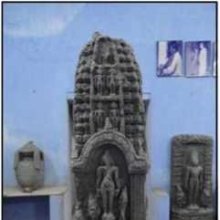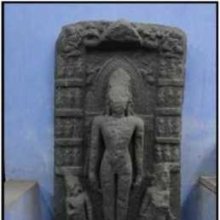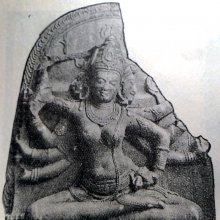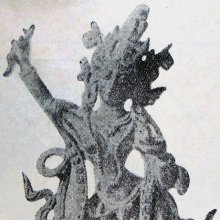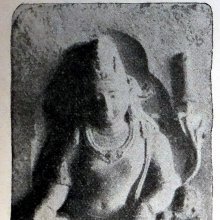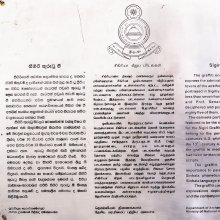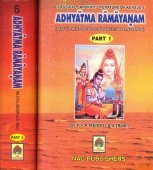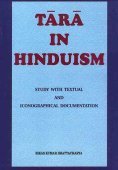Sahitya, Sāhitya, Sahityaramga, Sahityika, Sahityopasaka, Sahityopasaki, Sahityopasane: 14 definitions
Introduction:
Sahitya means something in Hinduism, Sanskrit, the history of ancient India, Marathi, Hindi. If you want to know the exact meaning, history, etymology or English translation of this term then check out the descriptions on this page. Add your comment or reference to a book if you want to contribute to this summary article.
Alternative spellings of this word include Sahity.
Images (photo gallery)
(+1 more images available)
India history and geography
Source: Cologne Digital Sanskrit Dictionaries: Indian Epigraphical GlossarySāhitya.—cf. sāhitī-vidyā. Note: sāhitya is defined in the “Indian epigraphical glossary” as it can be found on ancient inscriptions commonly written in Sanskrit, Prakrit or Dravidian languages.

The history of India traces the identification of countries, villages, towns and other regions of India, as well as mythology, zoology, royal dynasties, rulers, tribes, local festivities and traditions and regional languages. Ancient India enjoyed religious freedom and encourages the path of Dharma, a concept common to Buddhism, Hinduism, and Jainism.
Languages of India and abroad
Marathi-English dictionary
Source: DDSA: The Molesworth Marathi and English Dictionarysāhitya (साहित्य).—n (S) Materials, implements, tools, apparatus, furniture, gear; the means generally (whether of matter or of instrument) required for the production, formation, or performance of a thing or an act. 2 Companionship, fellowship: also connection, consociation, combination, confederation. 3 A covert name for Oil on certain seasons or occasions, esp. at dawn.
Source: DDSA: The Aryabhusan school dictionary, Marathi-Englishsāhitya (साहित्य).—n Materials. Fellowship; connec- tion. Literature. sāhītyasammalēna Literary conference.
Marathi is an Indo-European language having over 70 million native speakers people in (predominantly) Maharashtra India. Marathi, like many other Indo-Aryan languages, evolved from early forms of Prakrit, which itself is a subset of Sanskrit, one of the most ancient languages of the world.
Sanskrit dictionary
Source: DDSA: The practical Sanskrit-English dictionarySāhitya (साहित्य).—
1) Association, fellowship, combination, society.
2) Literary or rhetorical composition; साहित्य- संगीतकलाविहीनः साक्षात् पशुः पुच्छविषाणहीनः (sāhitya- saṃgītakalāvihīnaḥ sākṣāt paśuḥ pucchaviṣāṇahīnaḥ) Bhartṛhari 2.12.
3) The science of rhetoric, art of poetry; साहित्यपाथोनिधिमन्थनोत्थं कर्णामृतं रक्षत हे कवीन्द्राः (sāhityapāthonidhimanthanotthaṃ karṇāmṛtaṃ rakṣata he kavīndrāḥ) Vikr.1.11; साहित्यदर्पणम् (sāhityadarpaṇam) &c.
4) A collection of materials for the production or performance of anything (a doubtful sense).
5) Agreement, harmony.
Derivable forms: sāhityam (साहित्यम्).
Source: Cologne Digital Sanskrit Dictionaries: Shabda-Sagara Sanskrit-English DictionarySāhitya (साहित्य).—nf. (-tya-tī) Society, association, connection, combination. n.
(-tyaṃ) Poetry, belles-lettres, literary composition. E. sahita with, together with, aff. ṣyañ .
Source: Cologne Digital Sanskrit Dictionaries: Benfey Sanskrit-English DictionarySāhitya (साहित्य).—i. e. sahita + ya, I. n., and f. hiti, Society, connexion, combination. Ii. n. Poetry, Böhtl. Ind. Spr. 3250.
Source: Cologne Digital Sanskrit Dictionaries: Cappeller Sanskrit-English DictionarySāhitya (साहित्य).—[neuter] conjunction, association; literary composition, poetry.
Source: Cologne Digital Sanskrit Dictionaries: Aufrecht Catalogus CatalogorumSāhitya (साहित्य) as mentioned in Aufrecht’s Catalogus Catalogorum:—and sāhityagrantha alaṃk. B. 3, 58. Two useless entries.
Source: Cologne Digital Sanskrit Dictionaries: Monier-Williams Sanskrit-English Dictionary1) Sāhitya (साहित्य):—n. ([from] sahita) association, connection, society, combination, union with ([instrumental case] or [compound]; yena ind. ‘in combination with, together with’), [Kāmandakīya-nītisāra; Kapila; Kātyāyana-śrauta-sūtra [Scholiast or Commentator]]
2) agreement, harmony, [Prabodha-candrodaya]
3) literary or rhetorical composition, rhetoric, poetry, [Sāhitya-darpaṇa; Catalogue(s)]
Source: Cologne Digital Sanskrit Dictionaries: Yates Sanskrit-English DictionarySāhitya (साहित्य):—[(tyaṃ-tī)] 1. n. 3. f. Society, association. n. Literature.
Source: DDSA: Paia-sadda-mahannavo; a comprehensive Prakrit Hindi dictionary (S)Sāhitya (साहित्य) in the Sanskrit language is related to the Prakrit word: Sāhitta.
[Sanskrit to German]
Sanskrit, also spelled संस्कृतम् (saṃskṛtam), is an ancient language of India commonly seen as the grandmother of the Indo-European language family (even English!). Closely allied with Prakrit and Pali, Sanskrit is more exhaustive in both grammar and terms and has the most extensive collection of literature in the world, greatly surpassing its sister-languages Greek and Latin.
Hindi dictionary
Source: DDSA: A practical Hindi-English dictionarySāhitya (साहित्य) [Also spelled sahity]:—(nm) literature; ~[tyakāra] a litterateur, writer; ~[tya-śāstra] Poetics; ~[tya-śāstrī] a Poetician; ~[tyika] literary; ~[tyika corī] plagiarism; ~[tyika bhāṣā] literary language; ~[tyikatā] literariness.
...
Kannada-English dictionary
Source: Alar: Kannada-English corpusSāhitya (ಸಾಹಿತ್ಯ):—
1) [noun] the state or fact of being associated; an association; a combination.
2) [noun] all writings in prose or verse, esp. those of an imaginative or critical character, without regard to their excellence, distinguished from scientific writing, news reporting, etc.; literature.
3) [noun] a rhetoric composition or compositions.
4) [noun] the art or science of all specialised literary uses of language in prose or verse, including the figures of speech; rhetoric.
5) [noun] the theory or structure of poetry and expertise in this; poetics.
6) [noun] anything that is essential; the most important part or thing.
7) [noun] an essay, monograph or dissertation on scientific, technicl subjects.
8) [noun] all the writings of a particular time, language, country, region, etc.
9) [noun] a pamphlet, esp. one advertising or giving useful information on something; a pamphlet.
10) [noun] a learned man; a scholar.
11) [noun] collectively, all the provisions that is required for preparing food.
12) [noun] ಸಾಹಿತ್ಯ ಮಾಡಿಕೊಳ್ಳು [sahitya madikollu] sāhitya māḍikoḷḷu to make all preparations; to arrange all the required items for doing or making something.
--- OR ---
Sāhityaraṃga (ಸಾಹಿತ್ಯರಂಗ):—[noun] = ಸಾಹಿತ್ಯಕ್ಷೇತ್ರ [sahityakshetra].
--- OR ---
Sāhityika (ಸಾಹಿತ್ಯಿಕ):—[adjective] = ಸಾಹಿತ್ಯಕ [sahityaka].
--- OR ---
Sāhityōpāsaka (ಸಾಹಿತ್ಯೋಪಾಸಕ):—[noun] he who sincerely studies and enjoys studying literature.
--- OR ---
Sāhityōpāsaki (ಸಾಹಿತ್ಯೋಪಾಸಕಿ):—[noun] she who sincerely studies and enjoys studying literature.
--- OR ---
Sāhityōpāsane (ಸಾಹಿತ್ಯೋಪಾಸನೆ):—[noun] the act, practice of studying literature sincerely and enjoying it.
Kannada is a Dravidian language (as opposed to the Indo-European language family) mainly spoken in the southwestern region of India.
See also (Relevant definitions)
Starts with (+34): Sahitya-goshthi, Sahitya-sabha, Sahityabhashe, Sahityabodha, Sahityacandrika, Sahityacaritre, Sahityacintamani, Sahityacudamani, Sahityadarpana, Sahityadipika, Sahityahridayadarpana, Sahityajna, Sahityajnana, Sahityaka, Sahityakalpadruma, Sahityakalpapallavi, Sahityakalpavalli, Sahityakantakoddhara, Sahityakanthoddhara, Sahityakara.
Ends with: Abhijatasahitya, Ashlilasahitya, Bamdayasahitya, Dasasahitya, Janapadasahitya, Janasahitya, Laharisahitya, Lalit-sahitya, Lalita-sahitya, Lokasahitya, Maulika-sahitya, Navodayasahitya, Patratmaka-sahitya, Pravasasahitya, Purviya-sahitya, Savadhanasahitya, Vacanasahitya, Varita-sahitya, Yauna-sahitya.
Full-text (+1813): Sahityam, Lalit-sahitya, Sahiti, Sahityashastra, Sahityika-anama, Saahitiyik-bhashaa, Ghaslet, Sahityasharngadhara, Sahityaratnamala, Sahityataramgini, Sahityakautuhala, Sahityavicara, Sahityasarvasva, Sahityasamrajya, Sahityasara, Sahityakanthoddhara, Sahityakalpadruma, Sahityacandrika, Sahityacintamani, Sahityabodha.
Relevant text
Search found 68 books and stories containing Sahitya, Sāhitya, Sahityaramga, Sahityika, Sahityopasaka, Sahityopasaki, Sahityopasane, Sāhityaraṃga, Sahityaranga, Sāhityaraṅga, Sāhityika, Sāhityōpāsaka, Sāhityōpāsaki, Sāhityōpāsane; (plurals include: Sahityas, Sāhityas, Sahityaramgas, Sahityikas, Sahityopasakas, Sahityopasakis, Sahityopasanes, Sāhityaraṃgas, Sahityarangas, Sāhityaraṅgas, Sāhityikas, Sāhityōpāsakas, Sāhityōpāsakis, Sāhityōpāsanes). You can also click to the full overview containing English textual excerpts. Below are direct links for the most relevant articles:
Kavyamimamsa of Rajasekhara (Study) (by Debabrata Barai)
Part 1.2 - Meaning and changibality of the term Sāhitya < [Chapter 5 - Analyasis and Interpretations of the Kāvyamīmāṃsā]
Part 2.6 - Marriage of Kāvya-puruṣa with Sāhitya-vidyā-vadhū < [Chapter 5 - Analyasis and Interpretations of the Kāvyamīmāṃsā]
Part 2.3 - Genesis of Sāhitya-vidyā (literart criticism) < [Chapter 5 - Analyasis and Interpretations of the Kāvyamīmāṃsā]
Satirical works of Kshemendra (study) (by Arpana Devi)
4. Educational Life < [Chapter 2 - Kṣemendra: His Life and Works]
1. Date and Literary Career of Kṣemendra < [Chapter 2 - Kṣemendra: His Life and Works]
9.4. Summary of the Gaonboorā (1897) < [Chapter 1 - Introduction]
Yogadrstisamuccaya of Haribhadra Suri (Study) (by Riddhi J. Shah)
Chapter 1.6 - From Ācārya Tulsi to Modern Times < [Chapter 1 - The Jain Yoga Tradition—A Historical Review]
Chapter 2.3 - Date of Haribhadrasūri < [Chapter 2 - Life, Date and Works of Ācārya Haribhadrasūri]
Chapter 2.4 - Works of Haribhadrasūri < [Chapter 2 - Life, Date and Works of Ācārya Haribhadrasūri]
The Tattvasangraha [with commentary] (by Ganganatha Jha)
Verse 95-96 < [Chapter 3 - Dealing with the doctrine of both God and Primordial Matter (prakṛti)]
Sahitya-kaumudi by Baladeva Vidyabhushana (by Gaurapada Dāsa)
Source References < [Introduction]
Text 10.38 < [Chapter 10 - Ornaments of Meaning]
The Bible of Sanskrit Poetics < [Introduction]
Sanskrit sources of Kerala history (by Suma Parappattoli)
18. Other Campus bearing on Kerala history < [Chapter 5 - Sanskrit Dramas and Campus bearing on Kerala History]
Other works dealing with the history and culture of Kerala < [Chapter 2 - Historical details from Mahatmyas and Prashastis]
15. Short Poems describing Kerala history < [Chapter 4 - Traces of Historical Facts from Sandesha Kavyas and Short poems]
Related products
